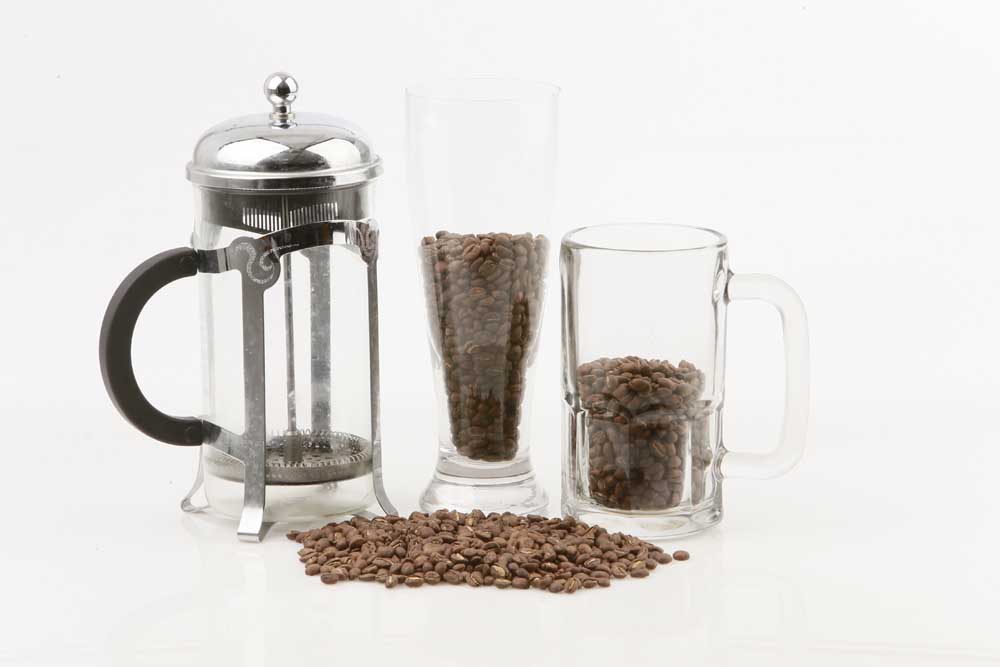What’s brewing?
Published 12:00 am Friday, April 11, 2014

- Rob Kerr / The Bulletin Collaborations between local breweries and coffee roasters have resulted in a number of coffee-infused beers. Pictured are beans from Backporch Coffee Roasters, which worked with Bend’s Boneyard Brewing on a collaborative coffee-beer called The Backbone.
For many Central Oregonians, mornings and evenings — sometimes even afternoons — revolve around two things: coffee and beer.
Plenty of local brewers get their morning started at locally owned coffee shops. And lots of local coffee roasters end their nights at local brewpubs.
“We get a lot of brewers who come in here in the mornings,” said Dave Beach, owner of Backporch Coffee Roasters. “Coffee people like beer and beer people like coffee. That’s kind of how it goes.”
Perhaps that’s why coffee-infused beers are a popular concoction in Central Oregon.
Though combining beer and coffee is by no means a new concept, the flavor combination continues to have relevance in the local beer industry as brewers push the boundaries of what typifies a coffee beer.
Deschutes Brewery recently collaborated with Lone Pine Coffee Roasters on a pub brew. Worthy Brewing has worked with Thump Coffee to create its Cuckoo Kawfee Porter. And Backporch Coffee Roasters coffee is used in Boneyard Beer’s The Backbone, a year-round stout. Over the years, Backporch has been a particularly prolific contributor to locally made coffee-infused beers, working with at least a half-dozen breweries, including Deschutes, Silver Moon, GoodLife and 10 Barrel on limited-release beers.
Beach said coffee is a versatile addition that, depending on the roast, ground, and method of infusion, can add everything from deep caramel flavors to delicate floral notes to a beer.
“It really depends on what the brewer’s looking for,” Beach said. “A lot of the sweet and caramel notes of roasted coffee go well with the barley and malt that brewers use.”
Though coffee can be added to beer in various forms, Beach said it’s often added to the beer through a cold extraction method, which means pouring cold water over coffee grounds and letting them sit overnight, then adding the strained liquid to the beer. The cold brew is highly caffeinated, Beach said, and about 30 pounds of coffee beans are added to each barrel of The Backbone. Though there’s caffeine in the final product, Beach said it isn’t really enough to cause any profound effect.
“I don’t think I’ve ever laid awake at night because of drinking coffee beer,” he said.
Chad Kennedy, brewmaster at Worthy Brewing Co., has used coffee in three of the brewery’s beers. Most recently, he infused Cuckoo Kawfee Porter with Ethiopian Yirgacheffe from Thump Coffee, which accentuated the beer’s natural coffee flavors.
Kennedy said one thing he has to watch for as a brewer is the amount of bitterness the coffee imparts to the beer.
“Too much bitterness is something you try to avoid,” Kennedy said. “It’s one of those flavors that I think you don’t want in there. Darker roasts sometimes have more of that astringency and bitterness.”
Scott Witham, co-owner of Lone Pine Coffee Roasters, has collaborated with McMenamins on two coffee beers. More recently, he collaborated with Deschutes Brewery on a specialty beer released as part of the brewery’s pub series. Brewers Alley Coffee Stout featured 32 pounds of El Salvador Siberia Estate Coffee beans from Lone Pine to create a rich stout. Witham said he suggested the medium roast coffee when Deschutes approached him about a collaboration.
“They wanted something pretty chocolatey and without much hop character,” said Witham, who used to homebrew. “I kind of steered them toward the Siberian Estate because it has a really nice malted chocolate profile. I think, at least for me, I gravitate toward coffees that are more medium roasted because there’s more nuance there.”
But while porters and stouts are the natural go-to when it comes to coffee infusions, brewers are starting to experiment with different combinations.
Backporch’s most recent collaboration is with The Ale Apothecary in Bend on a very unique brew. The Apothecary’s Paul Arney is using Backporch’s cascara, the coffee bean’s dried fruit skin, to create a barrel-aged black beer. The cascara, which Backporch buys directly from a farm in El Salvador, will add floral and fruity notes to the beer, and is being infused in the form of a tea.
Arney said he wanted to use the cascara after talking to Beach because he wanted to experiment with combining sour and roasted flavors together. The ingredient’s direct trade back story only heightened his interest in using it, he said.
Arney has dubbed the beer “Be Still” because it will be presented uncarbonated. It’s set to be released in September after it’s aged in pinot and rye whiskey barrels. Right before bottling, Arney plans to add cocoa nibs and possibly more cascara for aromatic purposes.
Beach said this is the first collaboration between Backporch and any brewery using cascara.
Worthy is also looking to experiment with coffee in different ways. Kennedy said that in the near future, he plans to infuse coffee into an IPA, something that’s being done over at Astoria’s Fort George Brewery in the form of its coffee IPA, Java the Hop.
But while local brewers experiment with coffee and beer combos, one thing is certain: They are not planning to add mass market coffee to their beer anytime soon.
“It would be sacrilegious to be a craft brewer and not go with a local roaster,” Kennedy said. “The whole point of our existence is to show that local is better, and smaller is better to some extent.”
— Reporter: 541-383-0354, mkehoe@bendbulletin.com.






